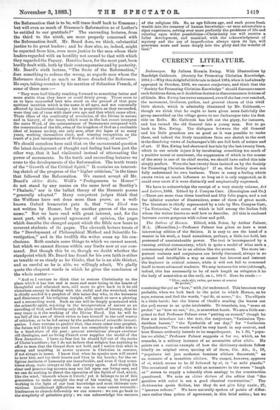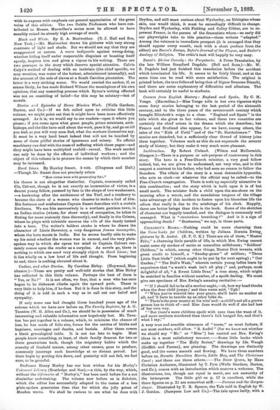The Satires of Horace. Edited, with Notes, by Arthur Palmer,.
M.A. (Macmillan.)—Professor Palmer has given us here a most interesting edition of the Satires. It is easy to see the hand of a master in his work, a hand sometimes, perhaps, a little too bold, but possessed of unmistakeable power. The text is 'accompanied by a running critical commentary, which is quite a model of what such a commentary should be in an edition like the present. The more im- portant variants and conjectures are briefly discussed, always in se pointed and intelligible a way as cannot but interest and instruct the beginner in critical science, while it will not fail to commend itself to more advanced students. We may instance his note (although, indeed, this has necessarily to be of such length as relegates it to the body of annotation at the end), on i., 108-9. Hero he reads :— " Blue, uncle abii, rodeo, qui nemo ut arum Se probet," construing the qui as" how," with fiat understood. This becomes very probable, when we look back to the point to which Horace, as he says, returns, and find the words, "qui fit, ut nemo," &e. The ellipsis is a little harsh ; bat the hiatus of Orelli's reading (he leaves out the qui) seems to us quite intolerable. To translate, too, " nemo ut probet "as " how no one," dc., is somewhat harsh. We are a little sur- prised to find Professor Palmer even "putting on record," though he does not introduce int the text, the conjecture, "fortissimo. Tyn- daridum harnm," "the Tyndarids of our day," for " fortiasima Tyndaridarum." The words would be very harsh in any context, and here Horace evidently intends to be magniloquent. In 1. 66, " popu- Ins me sibilat," Professor Palmer suggests si for tee, which, as he remarks, is a solitary instance of an accusative after sail°. He points out a curious example of how the dictionary-makers follow blindly an original error, quoting all of them, Cie. Att., ii., 19,. "populates isti jam modestos homines sibilare docuerunt," as an instance of a transitive sibilare. We cannot, however, approve of si, which seems to be ill followed by at, in "at mihi plaudo." The occasional use of rodeo with an accusative in the sense "laugh at" seems to supply a tolerably close analogy to the construction questioned. We note an obiter dictum of the editor that "the genitive with refert is not a good classical construction." The dictionaries quote &Bust, but they do not give Livy xxxiv., 27, " ipsorum referre." We have naturally spoken of points of differ- ence rather than points of agreement, in this brief notice ; but we wish to express with emphasis our general appreciation of the great value of this edition. The two Dublin Professors who have con- tributed to Messrs. Macmillan's series must be allowed to have sensibly raised its already high average of merit.







































 Previous page
Previous page